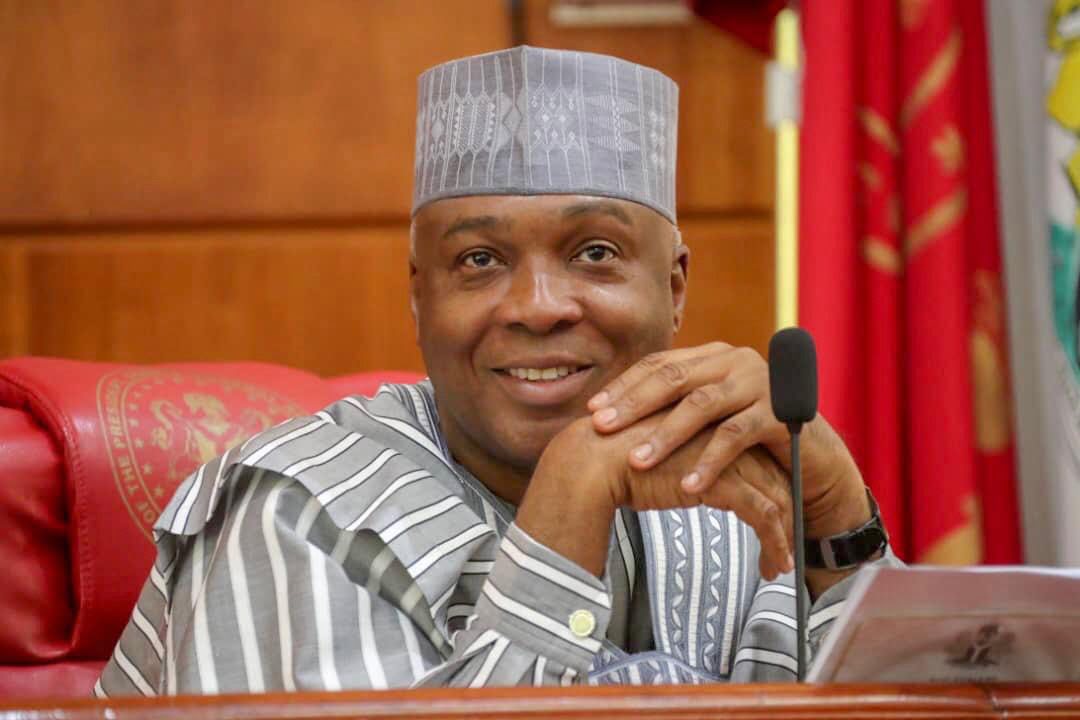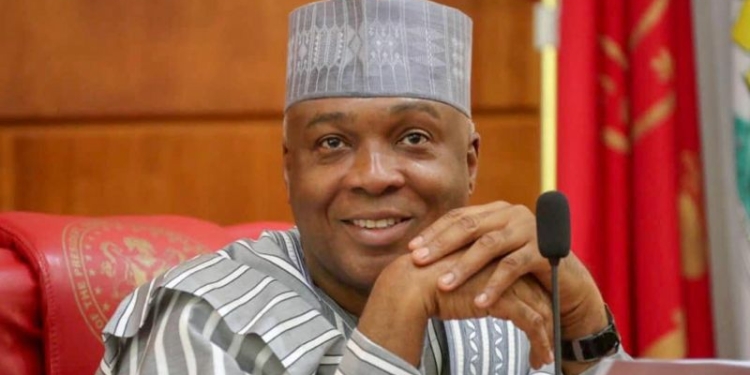Bukola Saraki is one of the most powerful politicians in Nigeria. But behind the political deals and maneuvers, there’s a personal story of ambition, family legacy, and overcoming adversity. This is an inside look at the life of Bukola Saraki.
You’ve seen him on the news and read about him in the papers, but now you’ll get to know the real Bukola Saraki. From his childhood as the son of a prominent politician to his rise to the pinnacle of political power, his journey has been marked by both opportunity and obstacles. Get ready to be fascinated by this profile of power. This is Bukola Saraki; unfiltered and unvarnished, brace yourself for some surprising revelations!
An Inside Look at the Life of Bukola Saraki

Abubakar Bukola Saraki was Saraki was born in London on December 19, 1962, to Florence Morenike Saraki and Olusola Saraki, a Senator in the Second Nigerian Republic. He is a Nigerian politician who was the 13th President of the Nigerian Senate from 2015 to 2019.
Bukola Saraki’s life has been full of power and politics. Born into a prominent political family, he seemed destined to follow in his father’s footsteps. Bukola Saraki is married to Toyin Saraki (née Ojora), with whom he has four children. Seni and Tosin Saraki are two of his children who are quite popular.
Education
Bukola Saraki attended King’s College in Lagos and graduated in 1978. From 1979 to 1981, he attended Cheltenham College, a public boarding school in the United Kingdom. From 1982 to 1987, he attended London Hospital Medical College at the University of London, where he earned a Bachelor of Medicine and a Bachelor of Surgery.
Early Career
Saraki worked as a medical officer at Rush Green Hospital in Essex from 1988 to 1989. From 1990 until 2000, he served as a director of Société Générale Bank (Nig) Ltd. Former President Olusegun Obasanjo appointed Bukola Saraki as Special Assistant to the President on Budget in 2000.
Political Career
As the son of Nigerian politician Olusola Saraki, Bukola grew up surrounded by power and privilege. He studied to become a doctor, but the call of politics was strong. At just 38, he was appointed as Special Assistant to the President on Budget.
Governor of Kwara State
Bukola Saraki campaigned for Governor of Kwara State under the People’s Democratic Party (PDP) in 2003, defeating incumbent Governor Muhammed Lawal of the defunct All Nigeria Peoples Party (ANPP). He was sworn in on May 29, 2003, and was re-elected in 2007.
Saraki led agricultural, infrastructure, health, education, power generation, and environmental policy improvements as governor of Kwara. One of his main accomplishments was importing displaced white farmers from Zimbabwe to Kwara State and providing them with a farm. This resulted in the creation of the Shonga Farms program, which is now being copied across Nigeria. Bukola Saraki was also appointed as the chairman of the Nigeria Governors Forum in 2007.
Senator
Saraki campaigned for Senator for the Kwara Central Senatorial District in 2011, following the completion of his two-term tenure as Governor of Kwara State. He was elected to replace his sister, Gbemisola Saraki-Forowa. He was appointed Chairman of the Senate Committee on Environment and Ecology, and he is also a member of the Senate Committee on Capital Markets and Finance.
Bukola Saraki campaigned heavily on health, food security, education, and the environment, calling for stronger legislation governing oil spill cleanup. Saraki also intervened in the lead poisoning situation in Zamfara State in 2010.
President of the Senate
Following his re-election in the 2015 general elections, he was elected unopposed as President of the Senate on 9 June 2015 by an all-party alliance of PDP and APC Senators. Saraki faced significant opposition from Senator Ahmed Ibrahim Lawan, who was favored by a group of APC senators-elect. Senator Ike Ekweremadu, his deputy, was elected in a highly contentious election.
On 3 August 2015, Senate President Bukola Saraki and a delegation of Senators traveled to Maiduguri, Borno State, to evaluate the devastation caused by the terrorist group Boko Haram in the north-eastern portion of Nigeria and to provide hope to internally displaced people.
Elections
Saraki declared his candidacy for the Peoples Democratic Party’s presidential primaries in 2011 but eventually backed out in favor of Northern Consensus candidate Atiku Abubakar. Saraki is a member of the Peoples Democratic Party (PDP) and previously of the All Progressives Congress (APC).
On July 31, 2018, he defected from the All Progressives Congress, only days after 14 senators defected to the opposition People’s Democratic Party (PDP). He blamed his defection on the intolerance of his previous party’s powerful members. Saraki announced his candidacy for the PDP presidential ticket in the 2019 election but was defeated in the primaries by Atiku Abubakar.
Saraki lost his Kwara Senatorial seat in the O to Ge movement to APC’s Dr. Ibrahim Oloriegbe. In the four Local Government Areas of Kwara Central Senatorial District, he received 68,994 votes to Oloriegbe’s 123,808 votes, a margin of 54,814 votes. Saraki said in January 2022 that he would run for President under the banner of the People’s Democratic Party (PDP) in the 2023 general election. At the People’s Democratic Party (PDP) presidential primary election conducted on May 28 and 29, 2022, he was defeated by Atiku Abubakar, who received the most votes (371), Nyesom Wike received 237 votes, while Saraki received 70 votes.
Bukola Saraki’s Corruption Cases
When it comes to corruption scandals, Bukola Saraki has faced his fair share. From shady bank deals to offshore accounts and suspicious political “donations,” Saraki’s time in public office has been marked by controversy.
Société Générale
Saraki served as a director of Société Générale Bank Nigeria (SGBN) Ltd. from 1990 to 2000. The Directors of Societe Generale Bank were later accused of misuse of depositor funds by Economic and Financial Crimes Commission (EFCC) Chairman Nuhu Ribadu, who was ultimately ousted from office.
Following a succession of court decisions, SGBN relaunched as Heritage Bank in 2012, becoming one of Nigeria’s best-capitalised banks with over US$1.5 billion in assets. It also became evident that there were planned manipulations to bring down the bank in order to smear Saraki’s reputation.
Paris Club loan
The EFCC allegedly charged aides to Bukola Saraki while he was the Senate President with laundering up to N3.5 billion from the Paris Club Loan Refund. The EFCC probe was given to President Muhammadu Buhari in a report on March 10, only five days before the Senate rejected acting EFCC chairman Ibrahim Magu.
Paradise Papers
In November 2017, the International Consortium of Investigative Journalism included his name on a list of lawmakers accused in “Paradise Papers” claims. According to data released as part of the Panama Papers, Bukola Saraki controlled Landfield International Developments Limited and Renocon Property Development Limited, but none of these offshore holdings were reported in Saraki’s official asset declarations at the time of these revelations.
Saraki was cleared of all allegations made against him by the Federal Government of Nigeria in July 2018, with the Supreme Court of Nigeria ruling that Saraki’s asset declarations during his public service tenure were “accurate and correct.”
Offa robbery
Saraki was accused of funding and arming the perpetrators of a deadly bank robbery in Offa that left at least 30 people dead, including police officers. Charges were dropped in suspicious circumstances, raising claims of political interference.
Saraki was summoned by the Nigeria Police for questioning in connection with the Inspector General of Police’s attempt to implicate him. He was later cleared of all allegations, though. Three years later, on January 6, 2021, two individuals filed petitions before the Kwara State Judicial Panel of Enquiry on End SARS, alleging that officers of the defunct Special Anti-Robbery Squad (SARS) tortured them into implicating Bukola Saraki in the 2018 Offa robbery.
Illegal forfeiture of properties and return to Saraki
On July 16, 2020, the Federal High Court in Lagos overturned an interim forfeiture ruling and ordered the Federal Government to return Saraki’s residences in Ilorin, Kwara State, to him.
Mismanagement and Illegal Sale of Kwara Government Assets
In May 2021, the Judicial Commission of Inquiry on the Sales of Kwara State Government Assets between May 1999 and May 2019, a commission set up by Kwara State Governor AbdulRahman AbdulRazaq, accused Saraki of selling state assets to cronies at suspiciously low prices and recommended that Saraki and his successor as Governor, Abdulfatah Ahmed, be prosecuted.
Saraki and others were accused of illegally selling government properties outside the state and mismanaging Shonga Farms and other assets. He denied any mismanagement and stated that he had not been invited to respond by the commission. Saraki further stated that the commission was prejudiced and was only an attempt by AbdulRazaq to “taint” his predecessors.
Trial
On September 18, 2015, Danladi Umar, Chairman of the Code of Conduct Tribunal, issued an arrest warrant against Bukola Saraki, making him the first Senate President in Nigeria to be issued an arrest warrant.
Nigerian Supreme Court
On Friday, July 6, 2018, the Supreme Court of the Federal Republic of Nigeria rejected all 18 corruption and fraudulent asset declaration accusations brought by the Federal Government against Dr. Abubakar Bukola Saraki following his election as Senate President.
A five-member panel of the Supreme Court, led by Justice Dattijo Mohammed, ruled on July 6 that the appeal court’s decision to concur with the tribunal in one breath and order Mr Saraki’s return to the CCT in the next amounted to a “judicial summersault.” As a result, the court upheld the Code of Conduct Tribunal’s June 2017 finding that the prosecution failed to prove its case against Dr. Saraki.
Bukola Saraki’s Titles and Honours
As the Senate President of the 13th Senate of the Federal Republic of Nigeria, Bukola Saraki holds several titles and has been conferred many honors.
Titles
During his time as Governor of Kwara State, Bukola Saraki was appointed Turaki of the Fulani emirate of Ilorin. A Turaki is a court officer in the chieftaincy systems of Hausa-Fulani kingdoms. After a few years, the Emir of Ilorin promoted him to the position of Waziri (or Prime Minister) of Ilorin. His father already held the title.
Honors
- In 2010, Saraki became the first Nigerian governor to be granted the National Honor of Commander of the Order of the Niger (CON). Other past governors were also honored that year.
- He was appointed to the Global Alliance for Clean Cookstoves leadership council, a United Nations Foundation program.
- Dr. Abubakar Bukola Saraki was appointed “Ambassador-at-Large” of the International Human Rights Commission (IHRC) on April 19, 2019.
Conclusion
So there you have it, a glimpse into the world of one of the most powerful people in Nigeria. Bukola Saraki is a political force with ambition and influence.
Saraki’s life has been marked by both controversy and accomplishment. Regardless of your view on Saraki’s politics or legacy, his rise to power and prominence on the global stage is a fascinating story.









Discussion about this post